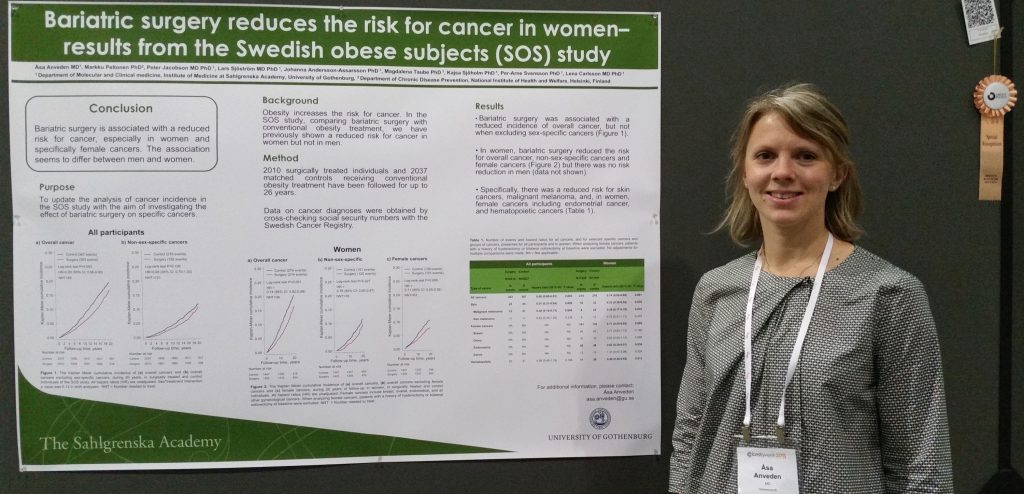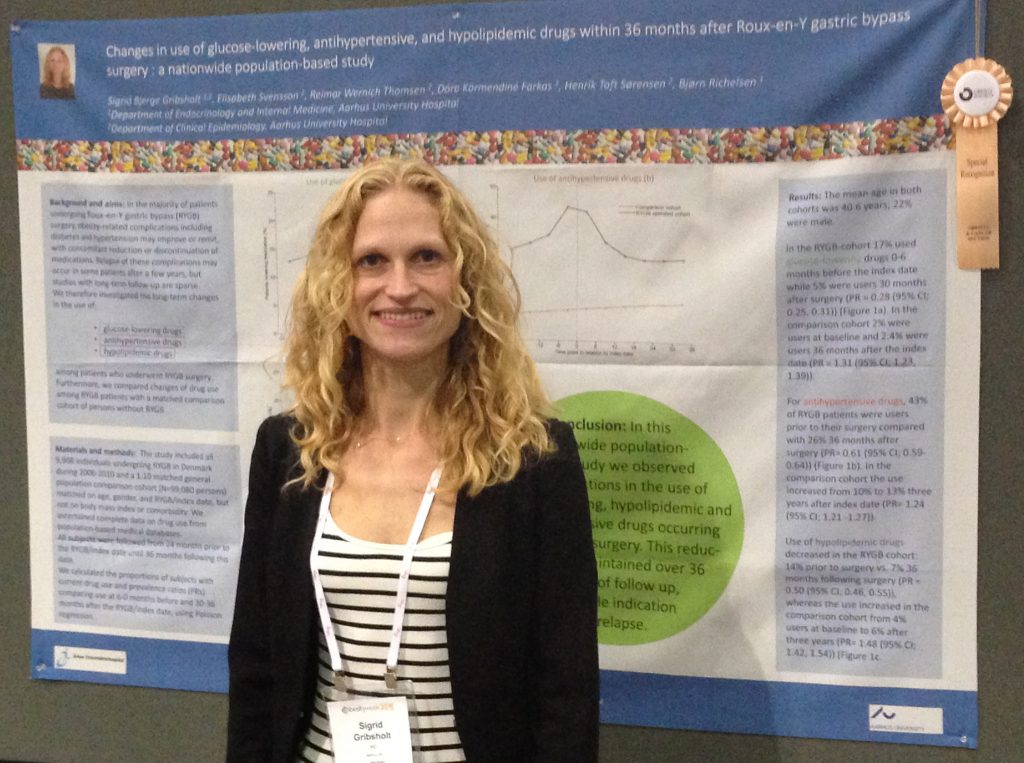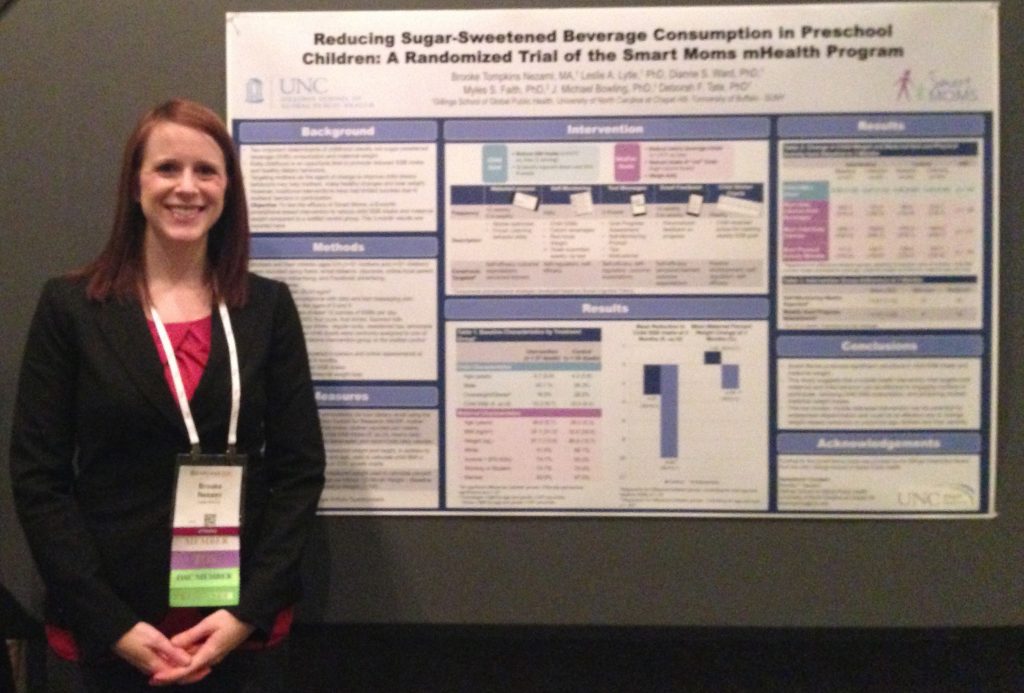How can bariatric surgery and a mom’s smartphone link to reduced cancer risk?
These studies were among the winners of the AICR research poster competition, announced yesterday at the annual Obesity Week conference. Obesity is associated with increased risk of a number of cancers, including ovarian, endometrial, and colorectal. The winners, awarded support by AICR, included three early investigators and two student prizes.
In no particular order, here are highlights of this year’s winners for outstanding posters. Congratulations to all. Note: these poster findings are not yet published and have not yet gone through the peer-reviewed process.
Ǻsa Anveden, MD PhD — University of Gothenburg, Sweden
 Bariatric surgery is one obesity-treatment option and previous research suggests decreased risk of cancer following surgery. This surgery may reduce the risk of cancer in obese women, suggests the finding of this study.
Bariatric surgery is one obesity-treatment option and previous research suggests decreased risk of cancer following surgery. This surgery may reduce the risk of cancer in obese women, suggests the finding of this study.
Anveden and her team followed over 4,000 obese people (70% women) for up to 26 years to look for cancer incidence. About half the participants had undergone bariatric surgery, and they were matched to a group of obese controls who received usual care.
The data, drawn from the Swedish Obese Subjects study, is the first long-term trial of its kind on the effects of bariatric surgery and various health outcomes.
Overall, the group who had undergone bariatric surgery had lower risk of cancer. When analyzing the data by gender, the lower link was only seen for women. Women had lower risk of several cancers, including breast, endometrial, ovarian and skin.
According to Anveden, these results add to a growing body of evidence for reduced risk of sex-specific cancers in obese women following bariatric surgery. She adds, “I hope that our findings will encourage the use of bariatric surgery as a means of preventing disease…rather than solely a weight-loss treatment, especially in the female obese population.”
Sigrid Gribsholt, PhD – Aarhus University Hospital, Denmark
– Aarhus University Hospital, Denmark
A bariatric surgery that changes the size of your stomach as well as how nutrients are absorbed (Roux-en-Y) is one type of gastric bypass that previous research suggests lowers the risk of diabetes, among other conditions. This could also mean reduced cancer risk. Evidence suggests that having type 2 diabetes increases the risk of several cancers, such as liver, pancreas and colorectal.
Gribsholt and her team looked at what medications about 9,900 Danish people were taking from six months before the bypass surgery until three years after the procedure. They also looked at medication use among about 100,000 people who did not have the surgery, matched by age and gender.
Researchers found that those who underwent gastric bypass were less likely to use medications associated with diabetes, high cholesterol, and high blood pressure for three years following surgery. These results indicate reduced disease and/or improved disease management.
“We hope that these findings will be taken into account in the pro and cons for bariatric surgery as a treatment option in severe obese subjects with metabolic complications,” says Gribsholt.
Brooke Nezami, MA (student winner) — University of North Carolina
Smartphone-based programs may help reduce intake of sugary drinks among children ages 3-5 while also helping their mothers lose weight. Avoiding sugary drinks and maintaining a healthy weight are two of AICR’s evidenced-based recommendations for cancer prevention, so this could have an impact on adult cancer risk, decades later.
For this small study, 51 overweight and obese mothers signed up to participate in a 6-month smartphone-based program to decrease how many sugary beverages their 3 to 5 year olds drank. All the children were drinking at least 12 ounces daily of a sugary beverage, such as fruit drinks, sodas or energy drinks. About half of the moms were randomly assigned to a wait list to serve as controls.
The mothers took part in web-based lessons, along with goal setting and self-monitoring via text message. They also received personalized text messages and emails along with prizes for children who met sugar-sweetened beverage goals.
After 3 months, the mothers had lost more weight and their kids had cut back on sugary drinks compared to the control group. The 6-months results are not yet available.
Nezami states that this type of program is low-burden for participants and has the potential to improve dietary choices for the whole family. “I hope that this research will lead to a greater interest in how we can best work with parents of young kids.”
Other winners include:
Ru-Jye Chuang, DrPH — University of Texas Health Science Center School of Public Health
Elizabeth Ma (student winner) — University of Alabama





